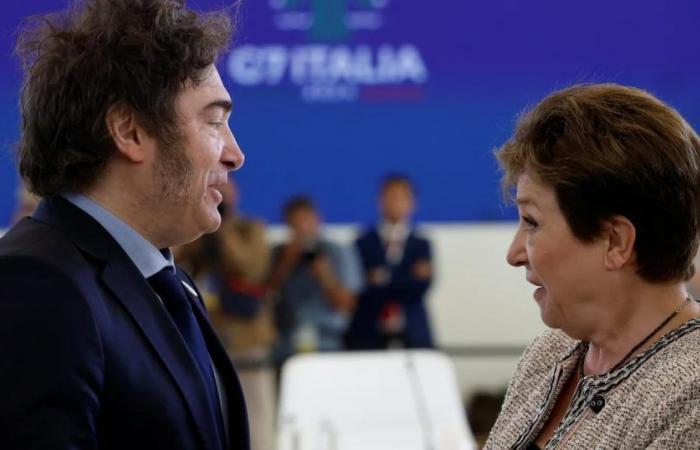
He International Monetary Fund He assured that inflation will decrease in Argentina at a faster rate than he expected and estimated that in 2024 will end up with 140% of annual price increases, although he also calculated that the recession will be harder than expected and that GDP will fall 3.5% this year.
Going forward, the IMF expects the Government to develop a roadmap to gradually lift the exchange controls and, at the end of October, a plan for a tax reform comprehensive. He also anticipated that the Executive Branch should end the differential dollar export scheme at the end of the month. blend (80% at the official exchange rate and 20% in cash with settlement) and suggested that the dollar should move at a rate faster than 2% monthly which a few days ago ratified Luis Caputo.
“The firm implementation of the stabilization plan (based on a strong fiscal anchor with no net new credit to the government and relative price corrections) has led to impressive foreign currency purchases by the central bank, the first consecutive monthly fiscal surpluses in almost two decades, notably smaller. Exchange gaps and sovereign differentials falling to multi-year lows,” the IMF acknowledged to the Government in the staff report published this Monday.
Anyway, he mentioned the Fund; “To sustain the solid progress already achieved and support the recovery, the following are required: (i) strengthen the fiscal anchor improving the quality and durability of ongoing consolidation through structural measures, some of which are currently under consideration by Congress and require timely approval; and (ii) improve the monetary and exchange rate policy frameworks and communication to firmly entrench the disinflation process, further improve reserve coverage, and support the transition to a new regime of “monetary competition,” the IMF mentioned.
Regarding this year’s recession, the organization worsened its most recent projection, although it improved its inflation projection. “Production will contract by around 3.5% in 2024 (previously 2.75 percent), although a turnaround in activity is expected during the second half of this year, as the headwinds of fiscal consolidation ease, real wages begin to recover and investment picks up. recover in response to the reforms,” mentioned the technical staff report approved by the board.
“Monthly inflation is expected to fall further, converging to around 4 percent by the end of 2024 (140 percent year-on-year versus 150 percent previously), and declining further in the medium term, as demand for pesos recovers from historically low levels,” the Fund continued. “Meanwhile, reserves are expected to remain unchanged as less favorable terms of trade are largely offset by higher net capital inflows. “Sustained fiscal and external surpluses in the medium term – supported by strict policies, productivity increases and structural improvements in the energy balance – will strengthen reserves and ensure prospects for access to international markets,” the organization noted.
Looking ahead to the coming months, the IMF believes that the Government will have to recalibrate some measures so that inflation can continue to fall, including interest rate policy, something that the organization had marked in recent hours as a priority.
“Monetary and exchange rate policies will evolve to strengthen disinflation and safeguard the accumulation of reserves. Specifically, to support the transition to a new monetary regime (“monetary competition”), the central bank will ensure that monetary policy rates move towards positive territory in real terms, while exchange rate policy will become more flexible with the easing of capital flow management measures as conditions permit,” the IMF said.
The technical staff reported that the Government committed to submitting to the Monetary Fund a roadmap for the exit, which is interpreted as rather gradual, from exchange controls. That document should be ready by the end of July as a reference date.
“Although the fixed crawl rate (2% monthly) has helped anchor inflation after the great devaluation, the authorities they will adjust the exchange rate policy over time to move more flexibly to better reflect the fundamentals and safeguard greater improvement in reserve coverage,” the agency’s technicians stated.
“Following initial measures to undo restrictions and exchange controls, the authorities remain committed to undoing all capital controls and exchange restrictions, starting with the most distorting measures, including the elimination of the preferential export 80:20 and remove the COUNTRY tax before the end of 2024″, he claimed. “More generally, a framework is being developed for a conditions-based relaxation of exchange controls, drawing on the experience of several countries and factors specific to Argentina to guide the implementation of an eventual exchange rate unification“, they stated.
In the section in which it analyzes the risks of implementing the current program, the organization chose to mention that “external conditions could become less favorable” but that on the domestic front “the current recession could be prolonged, fueling social tensions”. He also believes that the difficulty that the ruling party went through in Congress is another element that casts doubt on the chances of concrete deployment of the program with the Fund.
“Further delays in obtaining congressional approval of the fiscal and structural packages could also hamper stabilization efforts and require that strong compensatory measures under the control of the Executive, as necessary, to ensure all program objectives. Efforts must also continue to ensure adequate burden sharing and build consensus on reform, given the fragile social and political landscape,” they warned from Washington.
“Macroeconomic imbalances and obstacles to growth remain considerable and there is still a long way to go.” long and difficult adjustment process, where policies must evolve to build on previous achievements and support a rebound in activity. “Efforts are also being made to generate political and social support for the reforms, as well as to increase social assistance to protect the most vulnerable and ensure that the burden of adjustment does not fall disproportionately on working families,” he concluded in that section.
The Government also committed to the IMF to “develop and publish a draft proposal to improve the efficiency and simplicity of the tax systemincluding reorienting the system away from distorting taxes on trade and financial transactions”, something that should be finalized in October, a month after the presentation of the 2025 budget.





